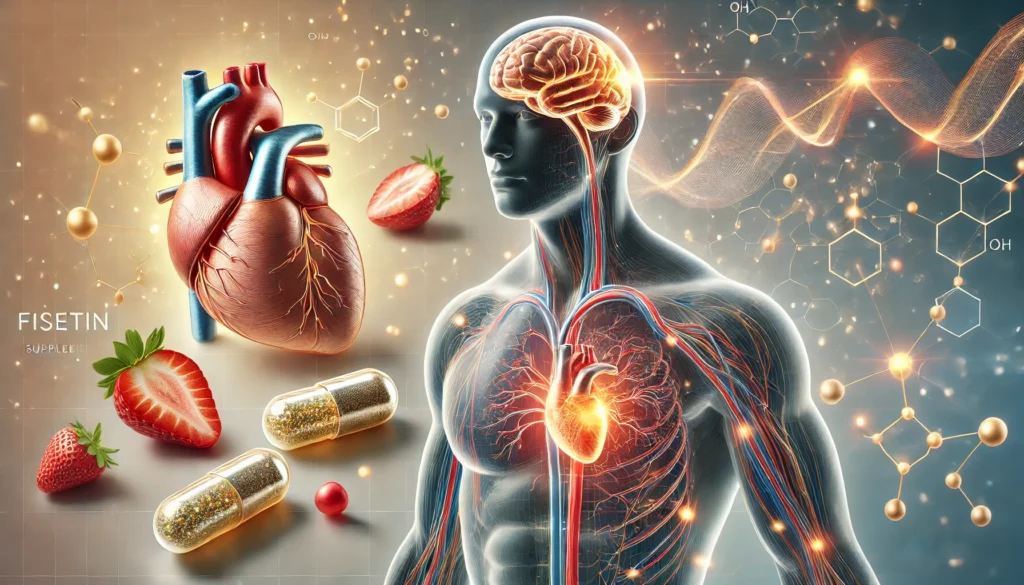Fisetin is a naturally occurring flavonoid with a potential role in increasing alertness, concentration, and cognition. This page intends to provide a thorough analysis of Fisetin, including its chemical structure, physiological mode of action, health advantages, ideal dosage, potential side effects, and drug interactions, for anyone interested in researching the responsible use of this nootropic supplement.
You May Also Like:
Iodine: Benefits, Dosage, Side Effects, Drug Interactions, and Other Important Information
Nature of Fisetin
Fisetin is a naturally occurring flavonoid that belongs to the subclass flavonol and is found in a variety of fruits, vegetables, and medicinal plants. Its unusual polyphenolic structure and hydroxyl groups in positions 3, 4′, and 7 contribute to its biological activity. As a nootropic dietary supplement, Fisetin is renowned for its antioxidant, anti-inflammatory, and neuroprotective qualities, which are a result of its capacity to influence many signaling pathways and interact with cellular targets.
Health Benefits of Fisetin
According to research, fisetin supplementation may improve cognitive function and memory due to its neuroprotective and synaptogenic actions. Long-term potentiation (LTP), a process related to the strengthening of synaptic connections and the development of new memories, has been demonstrated to be enhanced by Fisetin in mouse models. Furthermore, it has been discovered that Fisetin improves cognitive performance in animal models for aging, suggesting that it may be a promising treatment for age-related cognitive decline.
- Impact on antioxidants and inflammation
The antioxidant and anti-inflammatory characteristics of fisetin contribute to its overall health benefits. Fisetin may protect cells from oxidative damage and aid in maintaining cellular integrity by neutralizing free radicals and lowering inflammation. These qualities have been connected with potential advantages in chronic disorders characterized by oxidative stress and inflammation, such as cardiovascular disease, diabetes, and neurodegenerative diseases.
- Neuroprotection
Several in vitro and in vivo models have proven the neuroprotective benefits of fisetin, suggesting that it may hold potential as a treatment for neurodegenerative illnesses. In models of Alzheimer’s disease, Parkinson’s disease, and stroke, fisetin has been demonstrated to lessen neuronal damage, possibly due to its effects on autophagy, protein aggregation, and synaptic plasticity.
- Anti-aging Results
Fisetin is a possible senolytic agent, meaning it can selectively target and remove senescent cells. Senescent cells are defective cells that accumulate with age and contribute to age-related disorders. By increasing the elimination of senescent cells, Fisetin may assist in delaying the onset of age-related illnesses and extending the general health span.

Chemistry of Fisetin
Fisetin is also known by its chemical name 3,3′,4′,7-tetrahydroxyflavone. Fisetin is a flavonoid belonging to the subclass flavonol. It has the chemical formula C15H10O6 and a molecular mass of 286,24 g/mol. Flavonoids are a class of secondary plant metabolites distinguished by their polyphenolic structure, which consists of two benzene rings (A and B) linked by a heterocyclic pyrone ring (C). The hydroxyl groups at positions 3, 4′, and 7 of fisetin’s structure contribute to its distinctive biological activity.
Fisetin is present in numerous fruits and vegetables, such as strawberries, apples, persimmons, onions, and cucumbers, as well as in some medicinal plants. As mentioned in previous paragraphs, Fisetin contains antioxidant, anti-inflammatory, and neuroprotective characteristics due to its capacity to influence many signaling pathways and interact with cellular targets.
Physiological Mechanism of Action of Fisetin
Its powerful antioxidant and anti-inflammatory capabilities, as well as its ability to affect several cellular signaling pathways, are largely responsible for the nootropic and health-promoting benefits of fisetin. Among the most important mechanisms underpinning Fisetin’s action are:
- Antioxidant properties: Fisetin serves as a free radical scavenger, neutralizing reactive oxygen species (ROS) and reactive nitrogen species (RNS) that can harm cellular components and lead to oxidative stress. It has shown antioxidant capabilities in vitro and in vivo, protecting cells from oxidative damage and boosting cellular health.
- Reduce inflammation: Fisetin suppresses the activation of nuclear factor-kappa B (NF-B) which is a transcription factor with a central role in the regulation of inflammatory processes. By inhibiting NF-B activation, Fisetin decreases the production of pro-inflammatory cytokines and mediators, such as tumor necrosis factor-alpha (TNF-) and interleukin-6 (IL-6). This leads to an overall reduced rate of inflammation.
- Neuroprotection: Fisetin has neuroprotective effects through modulation of many signaling pathways involved in neuronal survival and plasticity. It activates the transcription factor cyclic AMP response element-binding protein (CREB), which controls the expression of genes involved in synaptic plasticity, learning, and memory. Fisetin also inhibits the mammalian target of the rapamycin (mTOR) pathway, facilitating autophagy and clearance of aggregated proteins, which may provide neurodegenerative disease protection.
Optimal Dosage of Fisetin
Owing to the paucity of human studies on Fisetin, the ideal dose for cognitive enhancement and other health advantages remains unknown. On the basis of animal studies and limited human data, a beginning dose of 100-200 mg of Fisetin per day may be suitable for supplementary effect. Since individual responses can vary, it is crucial to regularly monitor potential bad effects and modify the dosage accordingly with the help of a medical expert.
Side Effects of Fisetin
Fisetin is usually regarded as safe and well-tolerated, with minimal adverse effects observed. Fisetin has been shown in animal experiments to be non-toxic at standard supplement levels that are normally used. As with any dietary supplement, however, individual responses may vary. Certain users may report stomach discomfort, headache, or allergic reactions. It is recommended to begin with a low dose and raise it gradually as needed while monitoring for potential adverse effects.
Potential Substance Interactions with Fisetin
Although Fisetin is usually regarded as safe, it may interact with certain drugs or nutritional supplements. Examples of possible interactions include:
- Fisetin may have minor anticoagulant and antiplatelet effects, which may increase the risk of bleeding when combined with anticoagulant or antiplatelet drugs such as warfarin, aspirin, or clopidogrel. Before using Fisetin with these drugs, consult a healthcare practitioner.
- Medicines for Blood Pressure: The vasodilatory qualities of fisetin may have additive effects with blood pressure-lowering drugs, perhaps leading to hypotension. Before using Fisetin in combination with blood pressure drugs, closely monitor blood pressure and consult a healthcare practitioner.
Best Responsible Use of Fisetin
It is crucial for those interested in taking Fisetin as a nootropic supplement to adhere to the following recommendations for appropriate use.
- Begin with a low dose and gradually increase it as needed and constantly monitor for side effects or any unpleasant reactions.
- Contact a healthcare practitioner prior to mixing Fisetin with other drugs or dietary supplements, especially those with the potential for interactions.
- Do a comprehensive study on Fisetin, including its mechanism of action, benefits, and potential hazards to make an informed decision regarding its use.
- In addition to fisetin supplementation, consider combining other lifestyle elements that enhance cognitive health and overall well-being, such as regular exercise, a balanced diet, and sufficient sleep.
- Keep in mind that while Fisetin shows promise as a nootropic supplement, additional research, particularly in humans, is necessary to properly comprehend its long-term safety and effectiveness.
Fisetin: Conclusion
You might have not heard of Fisetin before reading this article. In short, Fisetin is a type of flavonoid that can be found naturally in various fruits and medicinal plants. The main health advantage of consuming Fisetin is improving your cognitive health and alertness. Since Fisetin is a flavonoid, it carries antioxidant and anti-inflammatory properties as mentioned in the article.
Aside from that, Fisetin can also effectively help with anti-aging as it is found that it can selectively target and remove aged cells. More research is needed to find out the exact mechanism of Fisetin and also the appropriate dosage for different individuals for cognitive improvement. Fisetin may react with certain anti-convulsants or anticoagulant drugs which lead to some potential side effects. Hence, it is always crucial to plan out your supplementation routine with a certified medical expert.

References:
Qnais, E., Alqudah, A., Bseiso, Y., Gammoh, O., Wedyan, M., & Alotaibi, B. (2023). Exploring the therapeutic potential of fisetin: a comprehensive study on its anti-nociceptive and anti-inflammatory effects. PubMed, 27(21), 10773–10784.
Hassan, S. S. U., Samanta, S., Dash, R., Karpiński, T. M., Habibi, E., Sadiq, A., Ahmadi, A., & Bungau, S. (2022). The neuroprotective effects of fisetin, a natural flavonoid in neurodegenerative diseases: Focus on the role of oxidative stress. Frontiers in Pharmacology, 13.
Yousefzadeh, M. J., Zhu, Y., McGowan, S. J., Angelini, L., Fuhrmann-Stroissnigg, H., Xu, M., Ling, Y. Y., Melos, K. I., Pirtskhalava, T., Inman, C. L., McGuckian, C., Wade, E. A., Kato, J. I., Grassi, D., Wentworth, M., Burd, C. E., Arriaga, E. A., Ladiges, W. L., Tchkonia, T., . . . Niedernhofer, L. J. (2018). Fisetin is a senotherapeutic that extends health and lifespan. EBioMedicine, 36, 18–28.
Important Note: The information contained in this article is for general informational purposes only, and should not be construed as health or medical advice, nor is it intended to diagnose, prevent, treat, or cure any disease or health condition. Before embarking on any diet, fitness regimen, or program of nutritional supplementation, it is advisable to consult your healthcare professional in order to determine its safety and probable efficacy in terms of your individual state of health.
Regarding Nutritional Supplements Or Other Non-Prescription Health Products: If any nutritional supplements or other non-prescription health products are mentioned in the foregoing article, any claims or statements made about them have not been evaluated by the U.S. Food and Drug Administration, and such nutritional supplements or other health products are not intended to diagnose, treat, cure, or prevent any disease.


